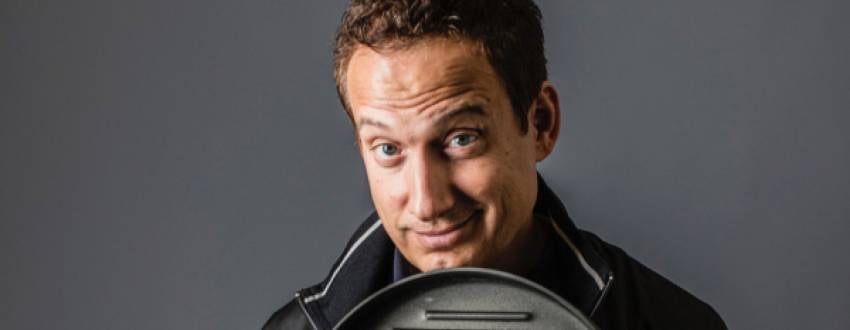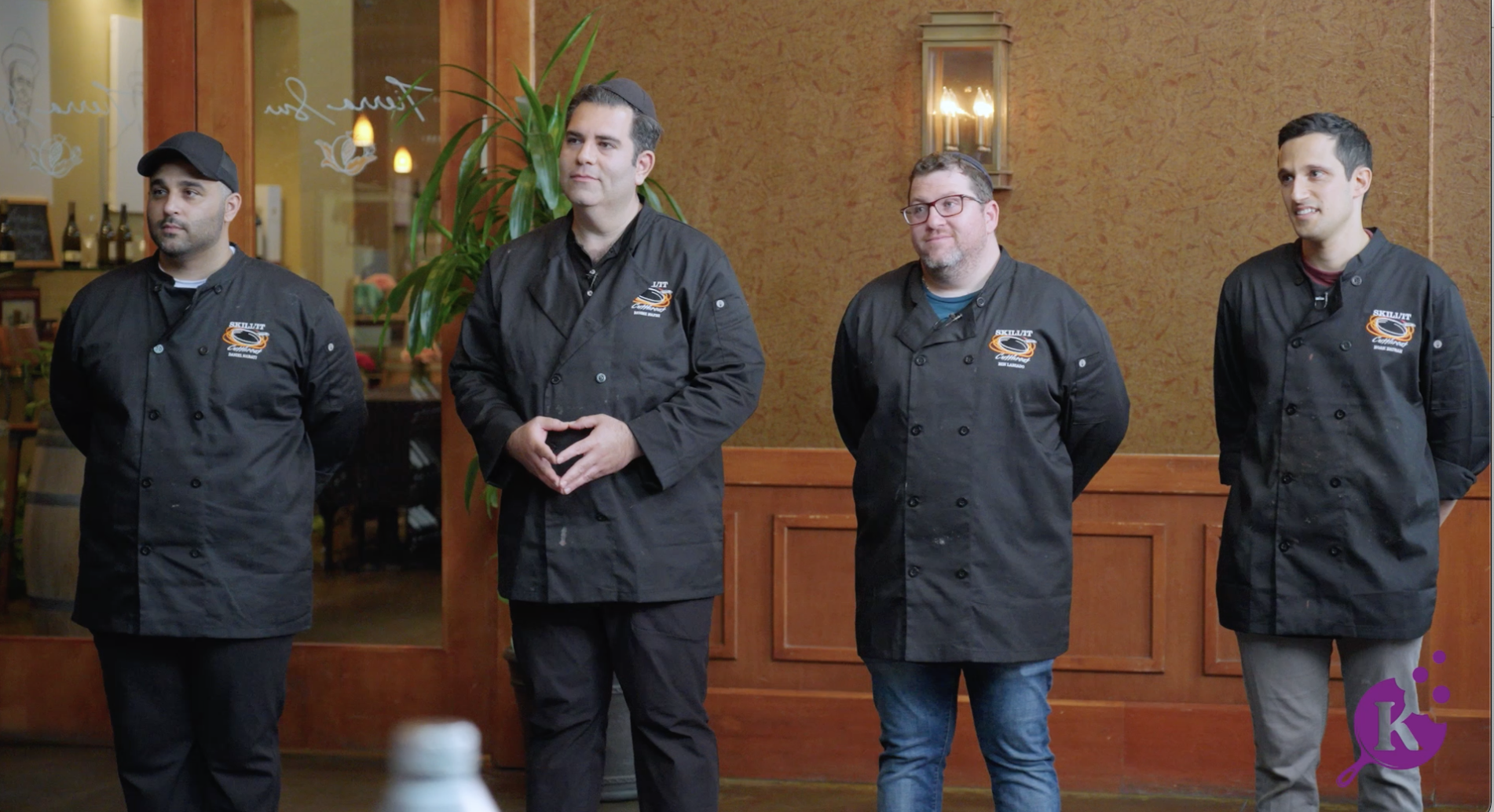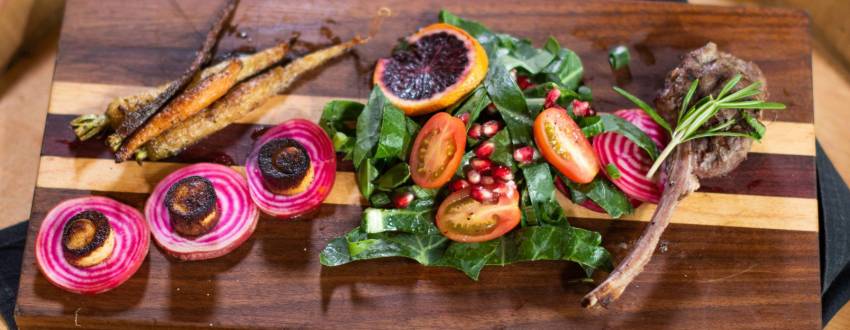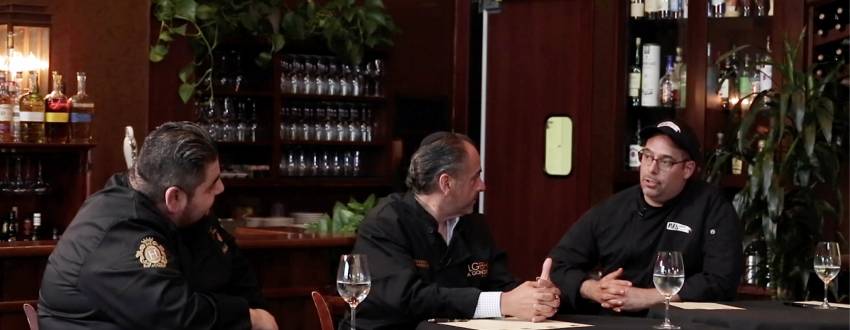Putting together a huge show like a cooking competition is nothing without its all-star crew: from the brilliant production team, to our intrepid contestants, to the discerning judges, to magnificent Malibu starring as, well, herself. Add world-renowned comedian, writer, actor, and producer Elon Gold as host, and no mic drop needed: his eponymous name speaks for itself.
(Guaranteed, however, he will speak regardless, as a man whose career is defined by his quick-wittedness and satire misses no opportunity to do so.)
Kosher.com’s Rivki Rabinowitz spoke with Elon at length regarding his experience as food show host – a job description he can now add to his abundant resume. What began as a 10-minute rapid-fire interview evolved into a 45-minute in-depth discussion, with Elon waxing eloquent about how this experience exceeded his expectations in every way.
Let’s chat:
Elon Likes Food:
Talk to me about your relationship with food. Are you as interested in it as would make your mama proud?
Oh, can’t say it any other way: I am obsessed with food. Like most Jews, it is a priority.
Do you cook at home?
Thankfully, my wife takes care of that. I do some grilling, not skilling.
Fave traditional Jewish food?
Stuffed cabbage to marrow bones – my wife makes a killer chulent.
Which cuisine has inspired you the most on your travels?
Paris is a foodie’s paradise. (Interjection: I KNOW! OUTRAGEOUS!) Outrageous. Everything you put in your mouth is fantastic.

Do you feel like hosting a food show requires a certain element of food knowledge, or is hosting a gig more dominated by the ability to create a vibe and less so about the content hosted?
You need a natural charisma, but it helps when you are passionate about food. If it were a show about golf, I would read the lines but not be as invested or naturally animated. I really cared about how the contestants were doing, what the judges said, how everything tasted. I was consistently excited.
Elon Was on Skillit:
What drew you in to this project?
It was a dream gig for me. There’s nothing I love more than food and comedy: I got to be funny while hosting this show and eating the entire time. Everything the contestants made I was tasting; I literally did not stop eating. I approached it tactically: I lost weight before the show so that I could gain on the show. I was ready!
Being on a job that combined Herzog wine, Tierra Sur food, and another reason to connect with my people was truly the dream gig.
Did you have a gut feeling about who would win before the competition started?
I wish I could say I did, but the contestants really kept me on my toes. Each dish was such an artistic expression, and the best dish ultimately won. Some chefs were done early and were just standing there as the timer ticked on by, but I would yell the time out to add to the pressure.
Finishing early can be a sign of skilled technique and execution, but overconfidence is the worst thing you can bring to a competition like this. The judges see right through that.
What secret ingredient would you have to open to feel like: “YES! I’ve got this!”
Coriander is the secret Jewish ingredient. Add to a burger or steak and suddenly it’s like a pastrami burger.
Do you think there are certain qualities that make a good competitor? How do you feel the competitors handled the pressure?
Skill for sure. Watching the chefs work, there were some shvitzing away who couldn’t deal with the “pressure cooker,” and there were others who thrived under it. I yelled the time out to amp them up and stress them out.
I’m still nervous before every single set, whether it’s before 32 people or 3,200 people. Every set matters to me. From that standpoint, I related to the levels of anxiety that go into executing a performance that you hope meets your goals.
Can you imagine yourself competing in something like this? After hosting it, do you have more respect for time based competitions?
No. All I want to do is EAT. I would never compete in a comedy competition. In comedy, you’re competing with yourself, or the audience; it’s a boxing match. Many chefs consider cooking artistry, but competition with stand-up isn’t good for anyone. In comedy, you’re as good as your last joke, set, special. You’re always moving on to the next gig. With food, you can build on previous layers and constantly evolve.

Which round was your fave?
Final. They literally brought out the mart of Meal Mart. The food was so incredible.
Elon Judges Judges:
What do you think makes a good judge?
A combination of expertise and being able to express your thoughts. A judge who knows their stuff but responds with one word answers is still not a good judge.
Truthfully, though, I was a huge fan of all of the judges.
Nir who runs LA Gondola, plus Chef Gabe who runs Tierra Sur, are both world class. I would sit down in one of their restaurants and pay hundreds of dollars to eat there. But on set, I was sampling nonstop.
One of the perks – because we filmed at Herzog winery, Chef Gabe would come over to us: “Good morning guys. Steak and eggs?” Suddenly out would come this breakfast order – the craziest sliced steak and eggs you’ve ever seen. There I was, just enjoying steak and eggs for breakfast. Then a few hours later: “Lunch?” Five-star duck, lamb Florentine, it was endless.
There was nonstop wine tasting – and some parts of the competition were actually pairing wine with food. One of the guest judges was a wine connoisseur – his knowledge was impressive.
Between the wine tastings and the food, the location and the company – the perks of this job were almost too good. I’m already praying it gets picked up for another season.
What do you think is the key to successful constructive criticism?
The judges were nice! We needed someone saying, this is (British accent) awful! In all seriousness, they still managed to be constructive and critical or speak their mind; no one was afraid to point out a wrongdoing, or point out a dish that was over-sauced, undercooked, etc.
Elon, The Host:
For someone with natural charisma and an innate sense of humor, hosting can appear to be effortless. Is it? And if not, in what ways are you working to create that environment?
It wasn’t hard. It was a fun, low-pressure experience. Because we weren’t live, I could keep fixing things. I have a whole new admiration for hosts who do this live and appear seamless.
I just did a live episode on an award-winning comedy show, and the host came over to me and said, “We do this until you and I both feel good about it.” That put me at ease more than anything else. It was the same here – once you’re not live, almost all of the pressure is off.

Do you feel a certain amount of responsibility to keep the event entertaining, or do you just gently push along the natural energy of each episode?
I wanted to keep it fun, funny, and moving. Cooking is arduous. Sometimes I would stand over a contestant’s shoulder and throw out a line to relax them. It was my job to navigate between judges and contestants and the actual hosting. As much as producers told me where I wanted to be, I was just walking around and bothering the contestants. I definitely got the stink eye a few times.
A lot of your material comes from the quirks of the Jewish community, spoken with affection as only someone with abundant Jewish pride can. What was it like hosting a show almost as if the characters had come to life?
Oh, it was surreal in the best kind of way. Art imitates life, just in the reverse.
As a comedian who has successfully straddled the mainstream entertainment industry, as well as found an avid audience within the Jewish demographic, do you feel proud to have facilitated a show that incorporates elements of high-end production while staying true to your standards?
This is what I do in stand-up: I bring real, high-quality show-business comedy to events. I don’t make fun – I make jokes with respect and love for my Jewish pride, and comes from a place of, “This is me, this is who I am.” I’m just preaching what I practice.
It was honestly incredible to be a part of it.
People had better download, watch it – it’s fun, it’s funny, it’s entertaining. I wish there was a scratch-and-sniff, scratch-and-taste; seriously, if only at home you could taste what we were tasting. I have a whole new level of understanding about what they’re doing on these cooking shows – it’s really cool and challenging. The degree of artistry that goes into something like plating seems fantastical until you’re on set watching the level of detail and dedication that goes into it.
On a show, it’s just a visual media, but when you’re hosting, it’s so much more than a visual media! It is all the senses, out to play in full enjoyment.
I loved doing it and I would do it again.
Season two: I’m coming for you!
This article originally appeared in Mishpacha Magazine. Reprinted with permission.






Reviews